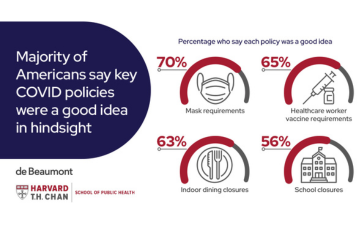
Fortunately, you don’t need a background in public health or medicine to support your local health departments. These agencies have many obligations during this pandemic response, and you can help them make it through this challenging time, no matter who you are.
Follow Public Health Guidance
Where to begin? The most important action you can take right now is following public health guidance. That means staying home and only leaving for essential errands or work. If you do go outside, wear a mask and stay at least six feet away from other people. We all have a responsibility to reduce the burden on the public health and healthcare systems. It may not feel like you’re doing much right now, but physically distancing yourself from others protects you, your family, your community members, and public health workers and others who are on the frontlines combating this pandemic.
Raise the Visibility of Public Health Workers
While you’re at home, take this opportunity to learn more about the governmental public health workforce. As you turn to your social networks to stay connected, look for examples of public health in action that you can highlight with a simple retweet or repost. Follow public health workers to get a sense of life on the frontlines of the COVID-19 response. Share the stories of public health employees contact tracing or helping people in quarantine, as well as those doing the kind of work that regularly goes unnoticed but has become more challenging in a large-scale crisis: coordinating with schools, assisting people who are homeless, providing resources to people in recovery, and much more. These are the narratives that need to be heard so that people can understand the value of public health now and long after this pandemic has abated. In addition, follow accounts of organizations that champion public health every day, including the American Public Health Association, Association of State and Territorial Health Officials, the Big Cities Health Coalition, de Beaumont Foundation, and National Association of County and City Health Officials.
Support Your Community
Even though many of us are living and working apart from one another at the moment, you can still build community cohesion by tapping into your networks and sharing information with your local health departments. During my time at the Boston Public Health Commission, we took part in a three-year initiative through the Centers for Disease Control and Prevention called “Partnerships to Improve Community Health.” Our project, “Let’s Get Healthy, Boston!,” focused on sustainable, multi-sector coalitions to reduce the burden of chronic disease and improve the health and wellness of our communities. We relied on a community advisory board and community health ambassadors, who linked us to trusted partners and harnessed the power of their neighborhoods to effect positive change.
As COVID-19 has turned our lives upside down, institutions that help us thrive continue to shutter and struggle. Follow local conversations happening on listservs, social media, or however your neighbors communicate to understand the most pressing needs. For example, many cities are experiencing disruptions in food distribution and are relying on community members to tell people who use the Supplemental Nutrition Assistance Program where they can access food. Maybe you can step up to help transport food or manage a Facebook page for volunteers. Or perhaps neighbors are asking for help walking their dogs or picking up groceries and prescriptions. You can be an unofficial community liaison with local public health workers, helping them determine how to prioritize various social support efforts.
Get to Know Your Local Health Department
Your health department is no doubt strained, but staff still need to know how the members of their communities are faring so that they can best serve them. If you can’t get a hold of a health department staff member on the phone, see if they are more responsive on email or social media. Visit your health department’s website, follow them on social media, and subscribe to their health updates and text alerts. Encourage your friends and family to take advantage of all the resources that local health departments have to offer.
Local health departments are doing outstanding work, even as they contend with devastating cuts to their funding and staffing. But it shouldn’t be this way. You can help turn this crisis into a call to action. By supporting public health professionals, you’ll improve your community’s health and safety. And when we come out on the other side, remember all that your local health department did to protect you.




